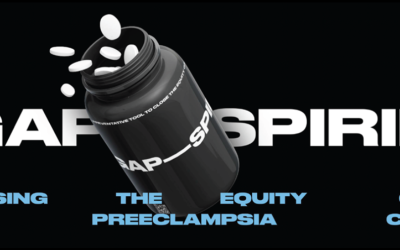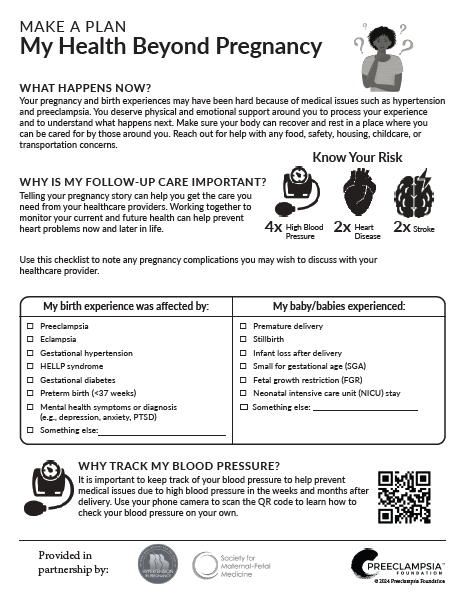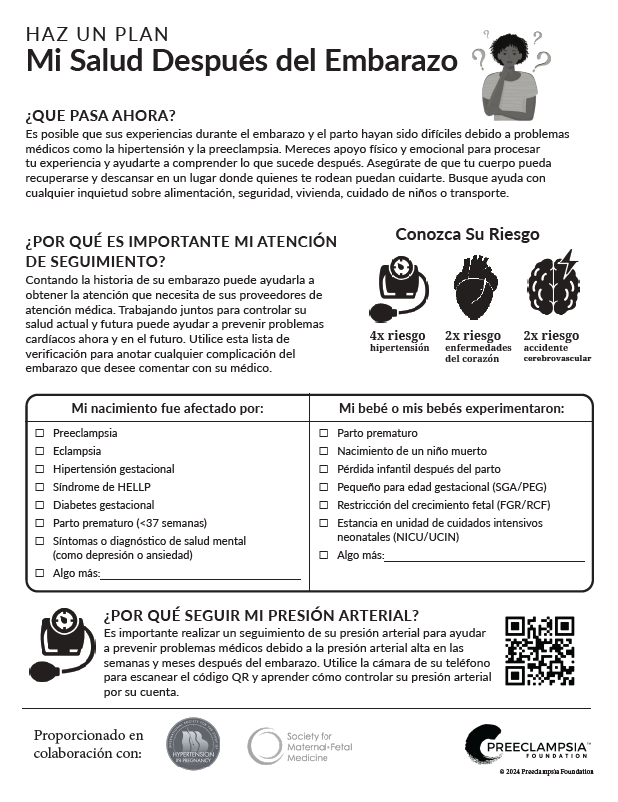
Resources for Nurses
You ensure good care happens.
Last Updated on February 08, 2022
Thank you for caring for patients like us.
As a nurse, you are an integral part of your patient's care. You support a pregnant patient during monthly check-ups, through labor and delivery, and the postpartum period. Nurses have the opportunity to form strong bonds with your patients and their families. Nurses are one of the most consistent and attentive caregivers in the clinical and hospital settings.
Going beyond pregnancy, nurses also play a role in patient advocacy. For preeclampsia patients, you may be their voice in an emergency situation. As a women's health, obstetric, and neonatal nurse, you may be the lifeline that recognizes that one symptom that feels "off." Or discovers her high blood pressure. Or holds her hand as she faces a difficult, life-changing health crisis like preeclampsia.
An informed nurse like you helps your patients navigate current and future health challenges.
Educating Your Patients
An educated patient is an empowered patient - and you are the front line of education.
Educating patients is the first line of defense when it comes to proper recognition and reporting of symptoms. Preeclampsia can be a rapidly progressing disorder with symptoms becoming more and more critical in a short window of time between regular prenatal appointments. The patient is often the first responder. With greater understanding of the seriousness of preeclampsia, comes greater compliance and reporting. But just telling patients about preeclampsia is not enough. (Familiarize yourself with the Signs and Symptoms.)
Pregnant patients have a generally poor understanding of preeclampsia, although improved understanding is associated with having received information from their provider. As a doula, you can be another way that patients get the education they need.
When women know how to recognize the signs and symptoms, and they understand the explanations offered, they are not only more likely to report symptoms but they are also more likely to comply with prescribed treatments. This has a direct impact on reducing adverse outomes. Download these social media educational tools from our Doula page to share with your patients.
Play Our "7 Symptoms" Video in Your Waiting Room:
Patient Care During Preeclampsia
Patient safety “bundles” – including Severe Hypertension During Pregnancy and the Postpartum Period – outline the most important clinical practices that should be implemented in every maternity care setting. The bundle describes what should be done, leaving the how up to the state or local hospital system. You can think of a bundle as the instruction manual for how doctors, nurses, midwives, and other healthcare providers should recognize and respond to preeclampsia, HELLP syndrome, and eclampsia.
Familiarize yourself with these guidelines and the most recent protocols to ensure your patients are receiving the best possible care.
We must also address the United States’ abysmal maternal mortality and morbidity rates by starting with a focus on racial equity in pregnancy and postpartum care, particularly as it relates to our preeclampsia community. We recommend starting with education available from the Black Maternal Health Caucus, the Center for Disease Control Department of Reproductive Health's Hear Her campaign, the Association of Women's Health, Obstetrics, and Neonatal Nurses (AWHONN) Birth Equity education resources, and programs like our MoMMA's Voices coalition that seek to integrate the lived experience of real patients into quality improvement in maternal health.
Immediate Postpartum Support
Patients who have experienced high blood pressure during pregnancy need to be closely monitored during the postpartum period. Preeclampsia can occur or worsen up to six weeks postpartum. The standard of care for most recently delivered women is to have a six-week checkup in the postpartum period, but preeclampsia patients should be seen within 48-72 hours of hospital discharge for a blood pressure check. They should also be provided with a postpartum "symptoms to report" educational tool like the AWHONN POST-BIRTH Warning Signs educational tool.
Research also shows that women who survive preeclampsia are four times more likely to experience post-traumatic stress disorder (PTSD) than women who have a healthy pregnancy. Having a trusted, informed nurse there to advocate for a woman and carry some of the emotional burden during such a distressing time can reduce short- and long-term trauma.
Use tools like the Edinburgh Postnatal Depression Scale (EPDS) to evaluate your patients' mental wellbeing in the weeks following her delivery. Ensure that she has
(Read our "Still at Risk" page for more tools.)
Share our Postpartum Preeclampsia Video:
Caring for Preeclampsia Patients "Beyond Pregnancy"
For nurses who handle the full spectrum of women's health, it's important to know that having had preeclampsia puts a woman at increased risk of heart disease, high blood pressure, and stroke five to fifteen years postpartum. She may also be at risk of other complications beyond pregnancy. (See our "Beyond Pregnancy" resource page.)
- United States (2013)
- Low-Dose Aspirin Use During Pregnancy (2018)
- United Kingdom (2010)
- International Federation of Gynaecology and Obstetrics (2016)
- World Health Organization (2011)
- Canada (2014)
- California Maternal Quality Care Collaborative Toolkit (2014)
- American Heart Association Women's Cardiovascular Disease (2011)
- Council on Patient Safety in Women's Health Care
- More International Care Guidelines
Related Articles

A key component needed in the fight against preeclampsia is the development of tests for simple, rapid, and accurate diagnosis and prediction through the development and adoption of biomarkers.

As a first step to address the need for self-monitored blood pressure, the Preeclampsia Foundation started providing the Cuff Kit® in June 2020 to women at highest risk of developing preeclampsia and...

Every woman should be able to check her own blood pressure at home.

Order our Ask About Aspirin Rack Card. Aspirin can prevent the formation of blood clots. This can make aspirin useful in treating or preventing some conditions like heart attacks and st...

Women who have had preeclampsia have three to four times the risk of high blood pressure and double the risk for heart disease and stroke: ensure they get follow-up care beyond pregnancy.

For more on the Preeclampsia Foundation's work to amplify all research related to biomarkers for improved prediction and diagnostic tools, please visit https://preeclampsia.org/biomarkers. INDIANAPOL...

GAP—SPIRIN campaign gets low-dose aspirin to those most at risk to help close the maternal health gap in preeclampsia ________ NEW YORK, January 23, 2025/PRNewswire/ – In recognition of...
1732072344.png)
While the Preeclampsia Foundation has been championing patient advocacy and representation for all families affected by hypertension in pregnancy throughout our 25 year history, we recognized the uniq...

Washington, DC – April 11, 2024 – On April 10, one day before the start of Black Maternal Health Week, the Preeclampsia Foundation in partnership with Thermo Fisher Diagnostics held a Hill...

Recently, I came across a social media post calling attention to the global maternal health crisis from a Black woman’s perspective. Someone responded to the post asking, “What’s rac...



